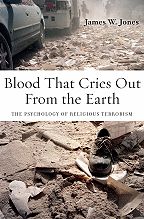This is the continuation of last week’s “gleanings.” Once again, I hasten to thank our correspondents for their questions and comments and want only to say something on the matter of protocol. When I receive private letters, I refer to the writers as “our correspondents” because I cannot know whether they want to have their names bandied about in the media.
The post Divide and conquer, or, the riddle of the word “Devisen” appeared first on OUPblog.
James W. Jones is Professor of Religion and Adjunct Professor of Clinical Psychology, at Rutgers University. His book, Blood That Cries Out From the Earth: The Psychology of Religious Terrorism, looks at what makes ordinary people evil. Jones argues that not every adherent of an authoritarian group will turn to violence, and he shows how theories of personality development can explain why certain individuals are easily recruited to perform terrorist acts. In the article below Jones argues that understanding people who turn towards terrorism is the first step to halting their violent acts. Check out Jones’s webpage here.
University. His book, Blood That Cries Out From the Earth: The Psychology of Religious Terrorism, looks at what makes ordinary people evil. Jones argues that not every adherent of an authoritarian group will turn to violence, and he shows how theories of personality development can explain why certain individuals are easily recruited to perform terrorist acts. In the article below Jones argues that understanding people who turn towards terrorism is the first step to halting their violent acts. Check out Jones’s webpage here.
How much do we really know about terrorism? The short answer is “a lot” and “a very little.” “Terrorism” — as the cliché about one person’s terrorist being another’s freedom fighter suggests — is more often used as an epithet or a bit of propaganda than a category useful for understanding. There is general agreement that terrorism is not an end in itself or a motivation in itself (except perhaps for a few genuinely psychotic individual lone wolves). No movement is only a terrorist movement; its primary character is more likely political, economic, or religious. Terrorism is a tactic, not a basic type of group.
The first step in clarifying this topic of “understanding terrorism” is to become clear about the purpose of our attempts to understand terrorism. Part of the confusion over the understanding of terrorism results from the more basic confusion of not knowing what we want our explanations of terrorism to do for us. Before we undertake to “explain” terrorism, we should be clear as to what we want this “explanation” to accomplish? Many hope that understanding terrorism will help predict future terrorist actions. Others hope that it will help devise effective counter-terrorism strategies. Will a psychological, or political, or military, or religious understanding of religious terrorism aid in those goals?
I know from my work in forensic psychology that predicting violent behavior in any specific case is very, very complicated and very rarely successful. And dramatic acts of violence that change the course of history — the assassination of the Archduke Ferdinand that lit the match on the conflagration of World War I, the taking hostage of the American embassy in the Iranian revolution, the 9/11 attack — are rarely predictable. We can list some of the characteristics of religious groups that turn to violence and terror. I have studied some of the themes common to Muslim, Christian, and Buddhist groups that have turned to terror. We can also outline the steps that individuals and groups often go through in becoming committed to violent actions. The NYPD has done exactly that in a recent study. But I remain skeptical that any model will enable us to predict with any certainty when specific individuals or groups may turn to terrorism. There are warning signs we should be aware of. But these are signs, not determinants or predictors.
As for counter-terrorism, it is an important strategic principal that one should know one’s enemy. We succeeded in containing the expansiveness of the former Soviet Union in part because we had a detailed and nuanced understanding of the Soviet system. Understanding some of what is at stake religiously and spiritually for religious groups that engage in terrorism can help devise ways of countering them. So a religious-psychological understanding of religious terrorists’ motivations can be an important part of the response to them.
In the months following 9/11 I often heard demagogues on the radio say that psychologists (like me) who seek to understand the psychology behind religiously motivated violence simply want to “offer the terrorists therapy.” The idea that one must choose either understanding or action — that one cannot do both — is an idea that itself borders on the pathological and represents the kind of dichotomizing that is itself a part of the terrorist mindset. Such dichotomized thinking, wherever it occurs, is a part of the problem and not part of the solution. I worked for two years in the psychology department at a hardcore, maximum security prison. But I never thought of that as a substitute for just and vigorous law enforcement. Understanding an action in no way means excusing it; explaining an action in no way means condoning it.
There is, however, a deeper issue here. Understanding others (even those who will your destruction) can make them more human. It can break down the demonization of the other that some politicians and policy makers feel is necessary in order to combat terrorists. The demonization of the other is a major weapon in the arsenal of the religiously motivated terrorist. Must we resort to the same tactic – which is so costly psychologically and spiritually – in order to oppose terrorism? Or can we counter religiously motivated terrorists without becoming like them?
ShareThis

Next 2k8 member to join the "Plagiarists anonymous" blog-week? Laurel Snyder, author of the new middle-grade fairy tale, Up and Down the Scratchy Mountains OR The Search for a Suitable Princess.
Laurel, what've you got for us? Just how bad is it?
Oh, man-- it's pretty bad.
See, the number one rule of stealing is that you're not supposed to steal from an obvious/famous source, right? You're supposed to steal something nobody will recognize. Or you're supposed to creatively tinker with what you've stolen, for a kind of meta effect.
Well I broke that rule without even realizing it. We were already in the copyediting stage when I started to have this weird feeling, this panicked sensation that one of the lines in my bookn was NOT MY OWN! It jsut felt like I'd seen it somewhere before...
Can you imagine?
The passage in my book was:
“Which way do you think you’re going anyway? North? North is nice, but then, South has its advantages too. And West rhymes with best, so it can’t be too bad. What’s your general direction?”
And although I didn't actually take this passage, word for word, I did totally steal it. From STUART LITTLE no less. Remember this?
"North is nice," said the repairman. I've always enjoyed going north. Of course, south-west is a fine direction too... and there's east. I once had an interesting experience on an easterly course..."
Imagine my horror when I figured it out, after a long night of poking around online, searching for a vague case of plagiarism. Because although I knew I hadn't really written it, I had no clue where I'd gotten it from. It was awful!
So that's it, my big experience as a thief.
Of course, I didn't actually make up the name of the villain from my next book, but I did pay for it, sort of. So that's not stealing, right? Just prostitution...
Yeah, okay, you're right, Laurel. We all agree. You're a total sleazeball, and you *should* be embarassed.
Just kidding. Sort of.




